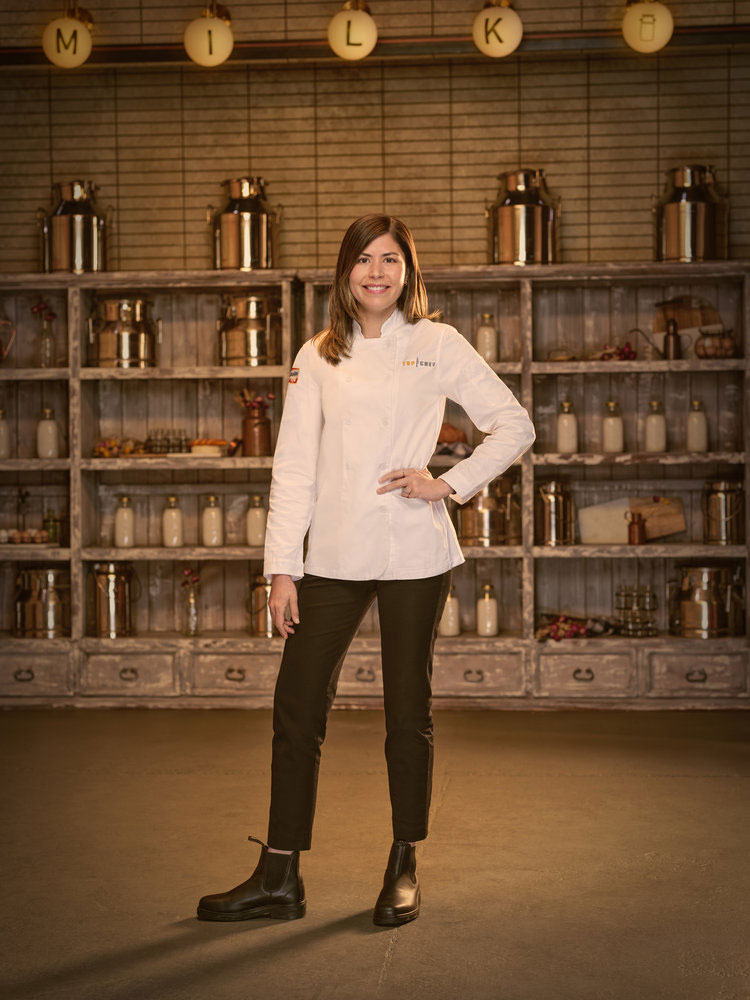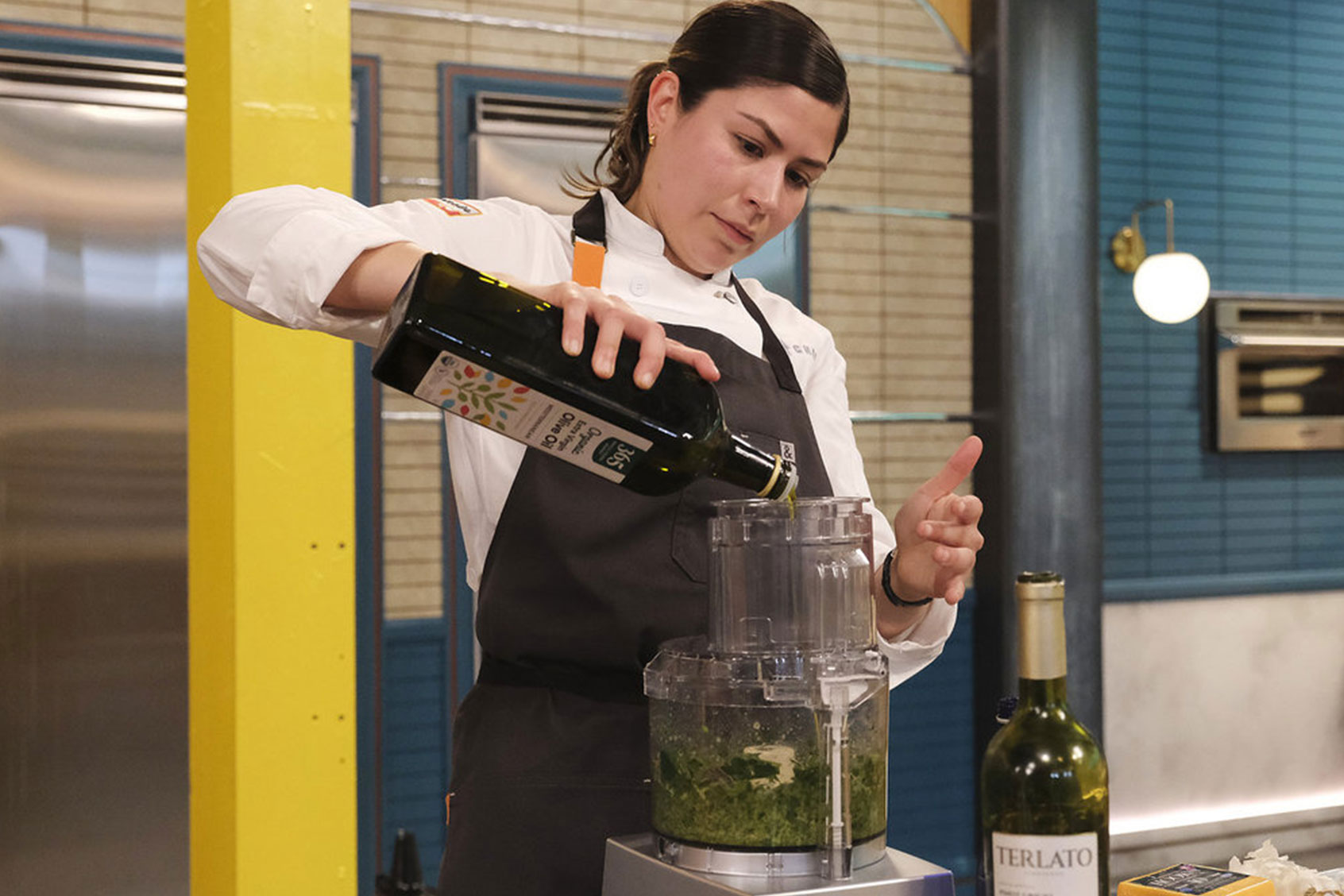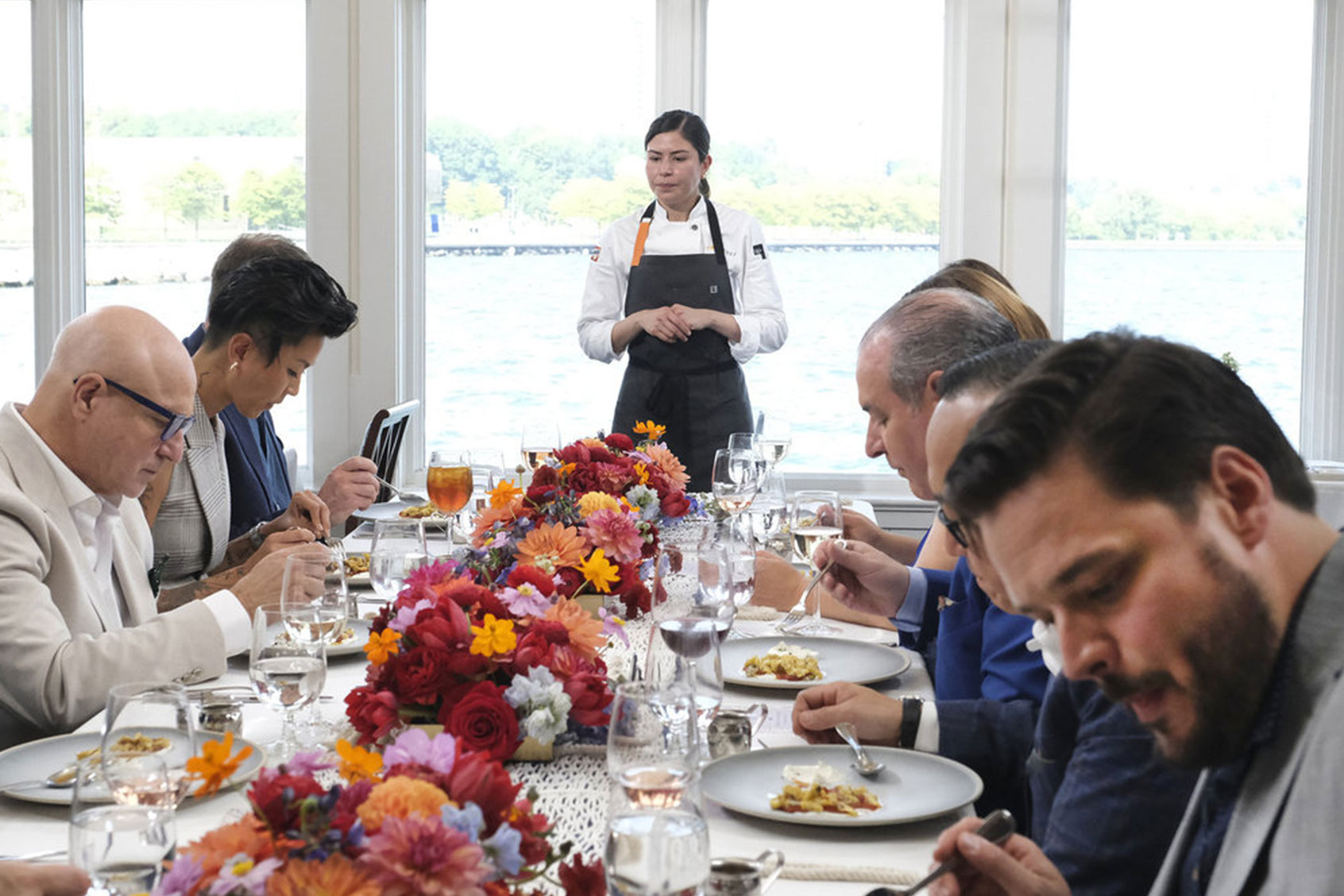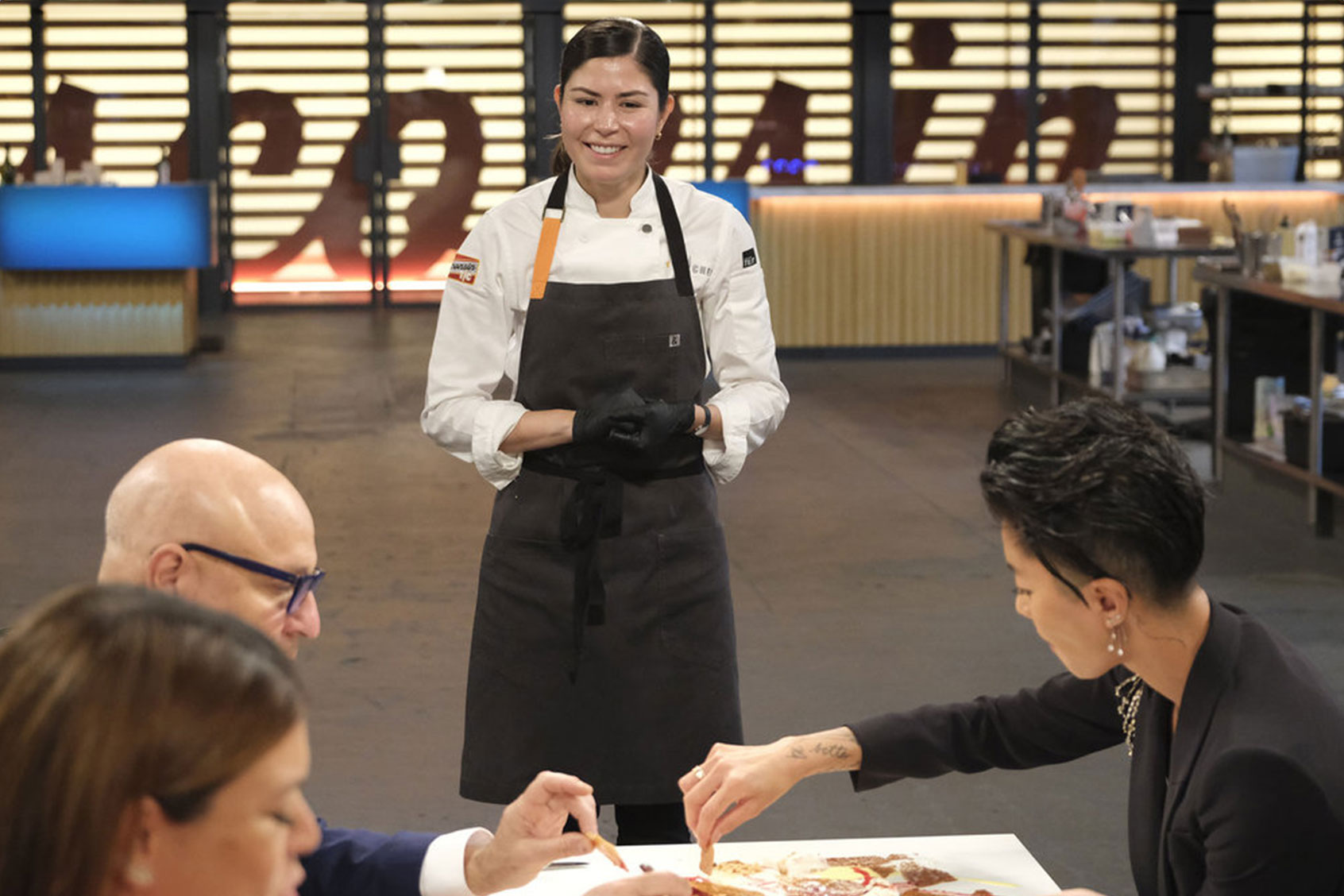At points during this season of "Top Chef," it seemed as though Laura Ozyilmaz was unfairly being pigeonholed as something approximating a "villain," something the show has largely gone without for many seasons now. As the series itself matured, with Padma Lakshmi as its guiding force, it was softer, kinder and more professional, with memories of forced head shaving a long-ago occurrence that'd never occur in today's "Top Chef" landscape.
However, at the end of the day, "Top Chef" is still television, so there always needs to be a storyline, rootable contenders (and in almost all cases, someone to perhaps root against). In this season, Ozyilmaz was sometimes slotted into a sort of antagonist characterization, with throwaway shots and confessionals used to establish her as somehow objectionable.
For me? I saw a remarkably talented, intrepid, competitive chef who was cognizant of the fact that she was part of a competition and television show that could truly change careers — and lives, at that. And she competed at the highest level, using her knowledge, her expertise and some strategy to ensure that she'd perform as well as possible against some incredibly skilled competition.
Unfortunately, though, Ozyilmaz was unceremoniously booted from the competition in episode nine, titled "The Good Land."
However, much like current host Kristen Kish and many others — including winners Brooke Williamson and Joe Flamm — Ozyilmaz battled her way back into the main competition, which she aptly celebrated by preparing a stunning tabletop dish in episode 11 and a magnificent manti dish in episode 12.
Once the competition took to the sea, though, Laura fell victim to unappetizing banana leaves and a roasted dish that came off as more baked and she was told to "pack your knives and go" a second time.
Salon Food had the opportunity to speak with Ozyilmaz about her experiences, what led her to "Top Chef," her marvelous and beautiful restaurant Dalida (truly, look at some photos online of the interiors alone), and why the show "affirmed [her] love of food and of being a chef".
 Laura Ozyilmaz on "Top Chef" (Stephanie Diani/Bravo)
Laura Ozyilmaz on "Top Chef" (Stephanie Diani/Bravo)
The following interview has been lightly edited for clarity and length.
Hi! Was there anything about competing on the show that you didn't anticipate? Either from the competition standpoint itself, from the tv perspective, or perhaps even from watching yourself back after months have passed?
I did not anticipate the feeling of being disconnected from the outside world while filming "Top Chef." My family is back in Mexico and my husband's family is in Istanbul. My only way to stay connected with my loved ones is through my phone, which I didn’t have access to during the competition.
Did you have a favorite challenge? Conversely, was there a challenge you really didn’t enjoy?
I loved the sausage challenge. I had so much fun cooking at the American Family Field. My chorizo kebab taco was a dish that I always wanted to make, and the judges loved it. Everyone was in such a good mood that day, and we all loved seeing the sausages race.
The hardest challenge was the one where I got eliminated. Overall, there were many obstacles that made it hard to succeed in that challenge.
Which dish were you proudest of? I was so impressed with your tabletop challenge dessert dish (with baklava, maraş, and sour cherry) and your manti dish in the top 5 elim. Challenge!
While competing on the show, I was always so surprised that I could do so much in such a short period of time. The baklava table was a forum for me to bring in some creativity and showcase my love of cooking.
I made three different types of ice cream, three sauces, a crumble, a meringue, garnishes and a baklava ring. Even though the judges had previously encouraged me to make dishes with fewer components, I felt that this challenge was calling for me to go all out, and I’m so glad that they loved the final result.
What was the biggest lesson you learned, culinarily or personally?
I realized that I am a huge fan of this industry. The competition affirmed my love of food and of being a chef. It made me appreciate my team, my customers, and my community even more.
“Top Chef” gave me a forum to show my skills, but it also reminded me that I am nothing without my people. I was so inspired to come back to San Francisco and bring people together while cooking good food at Dalida.
Want more great food writing and recipes? Subscribe to Salon Food's newsletter, The Bite.
Do you have a number-one favorite ingredient to work with?
I am not attached to specific ingredients, but I absolutely love the produce in California. I go to the farmers market every week and get inspired by the freshness and variety of fruits and vegetables that are available to us. I like to create dishes that have a sense of place, culture and innovation.
What, if any, special ingredients did you bring to Curacao?
We were on a cruise ship and we could not bring anything from other places. I was excited to work with Caribbean ingredients because I grew up in Acapulco. Working with tropical ingredients brings back the best memories.
What was the critique you received during the show that you learned the most from?
I initially wanted to showcase my skills by preparing multiple elements for each dish. On multiple occasions, the judges encouraged me to reduce the number of ingredients, components or flavors. Over the course of the show, I learned to cook simpler and more focused dishes.
What was your favorite moment?
I was so surprised when I won Last Chance Kitchen. I have so much respect for the other contestants who were fighting to get back on “Top Chef.” It was very intimidating because they were truly some of the best. I could not believe I was given a second chance to go back and compete.
 Laura Ozyilmaz on "Top Chef" (David Moir/Bravo)
Laura Ozyilmaz on "Top Chef" (David Moir/Bravo)
How did you practice or prep. during the six week break before Curacao?
When I left for the competition, I had just opened a brand-new restaurant, Dalida. I didn’t spend much time preparing for the show because I had to focus on my business and employees during the break. When the competition resumed, I had to rely on my sixteen years of experience as a chef.
What did the Top Chef “incubator” teach you? I spoke with Buddha just after his win last year and he referenced how it can be so great to singularly focus on cooking — not bills, not customers, not the daily minutiae of running or working in restaurants, etcetera. I always thought that was a great point.
It teaches you to find the motivation within yourself. You have to find the mental strength to keep going and to continue being creative. Everyone is in the same shoes and the stress can be very high. It is an emotional rollercoaster, but the experience helped me find the confidence and energy to make it through challenging times.
What was the biggest thing about Wisconsin — either from a food perspective or otherwise — that you've taken with you?
The people! Everyone was so sweet and welcoming to all the chefs. I was also so impressed by how proud they were to be from Wisconsin. I could feel a sense of community whenever I had the opportunity to interact with Wisconsinites.
What was the Last Chance Kitchen experience like for you? Did you find that format simpler to navigate than the competition proper?
I loved it! I felt I had a handle on Quickfires and going through Last Chance Kitchen felt like a similar challenge. With the focus shifted to a smaller group of people, it actually feels a bit more manageable. I appreciated the opportunity to get direct feedback from Tom Colicchio.
Did you feel like your second elimination didn’t "sting" as much since you had already experienced that “pack your knives and go” moment once before?
The second elimination was harder than the first one. When you get that close, you feel like you have a chance of becoming "Top Chef." You also get closer with the other chefs and want to experience the finale with them.
We need your help to stay independent
Tell me a bit about your experience in the industry?
I always knew I wanted to be a chef. I started my career in Mexico City and attended Centro Culinario Ambrosía while working at different catering establishments. I then continued my education at New York’s Culinary Institute of America (CIA).
I worked at Cafe Boulud, and later at Mugaritz in San Sebastian, Spain while simultaneously enrolled at the Basque Culinary Center. After my graduation from the CIA, I joined the teams at Eleven Madison Park and Del Posto in New York City. In San Francisco, I accepted a job offer at Saison and continued my focus by opening a pop-up restaurant called Istanbul Modern SF.
Later, I opened my first restaurant, Noosh, and consulted for other establishments like New Belgium Brewing Company. I also taught cooking classes part time at the Culinary Institute of America, Copia in Napa. Finally, last year, I opened my beloved Eastern Mediterranean restaurant, Dalida, in the Presidio of San Francisco.
How did you wind up on Top Chef in the first place? Did you audition?
I was invited to participate in the show a couple years ago, but this time, it felt like the right moment. I was lucky that my husband could cover for me in our shared business, so I decided to compete even though we were in the process of opening Dalida.
 Tom Colicchio, Kristen Kish, Laura Ozyilmaz, Paul Bartolotta and Kyle Knall on "Top Chef" (David Moir/Bravo)
Tom Colicchio, Kristen Kish, Laura Ozyilmaz, Paul Bartolotta and Kyle Knall on "Top Chef" (David Moir/Bravo)
Why do you cook? What stands out for you as a formative moment that got you into cooking or food at large?
I started cooking because I simply love food – mainly, I love eating. I have so much passion for ingredients, spices and cooking techniques. I am always researching new restaurants, looking into cookbooks, as well as food magazines and podcasts. I am a foodie at heart.
When I was around 13 years old, my family and I went on a trip to Oaxaca. During this trip, we met a chef who showed us around the city. After exploring markets and restaurants together, I realized I wanted to dedicate my life to being a chef.
What is your favorite cooking memory?
For our honeymoon, my husband and I went on an eight-week tour of stages where we worked at 20-plus restaurants across the US and Mexico. We started our journey in New York City and ended in San Francisco. Some of the restaurants we visited were Zaytinya and Minibar in Washington, DC, Husk in Charleston, Pujol and Quintonil in Mexico City, and Restaurant Guy Savoy and Joël Robuchon in Las Vegas.
What’s your biggest tip for cutting down on food waste?
My restaurant is inside a national park site, making it all the more important to develop sustainable practices. We source some of the vegetables and garnishes from our own garden. This brings us closer to our goal of being zero-waste because we only pick what we need that day.
It is important to work with the seasons and develop techniques that allow you to use one ingredient in multiple dishes. For instance, we make our own cordials in house, including Nocino. After we macerate the walnuts in alcohol, we take them out and cook them in sugar to serve with one of our desserts. We also make cabbage leaf dolmas during the winter, fermenting the leftover cabbage core and serving it with dukkah and a sauce made with walnuts.
Were there any guest judges this season that you felt particularly fond of, connected to, or impressed by?
Our interactions with the guest judges were limited, but the words of encouragement that Chef Ed Lee shared with me during my last elimination challenge were very inspiring. He had so much sympathy for all of us, but at the same time was able to express concise and honest feedback.
Did you do any sort of special prep for "Top Chef"?
Unfortunately, no. When I was recruited to join the competition, I was in the middle of opening my restaurant. I finally had some time to watch past episodes about two weeks before the competition, and even that was late at night after a long service. I was only able to watch a few, and then I was off to Wisconsin.
What’s next for you?
I am thrilled to continue the work I do at my restaurant, Dalida. I work with an incredible team in the beautiful city of San Francisco. I want to continue working towards a better culinary industry and create spaces where people from any path can enjoy warm hospitality and thoughtfully crafted food.
I am now even more inspired to create culinary experiences that offer a sense of comfort, culture, and community.
Read more
about this topic


